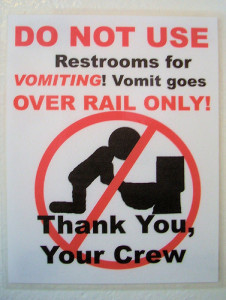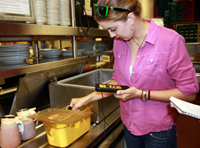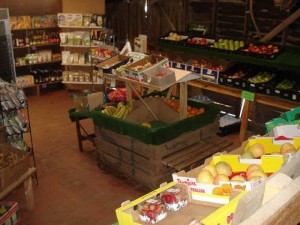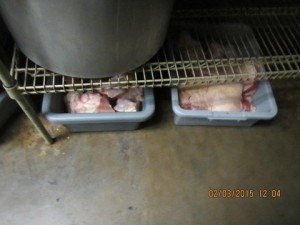What I said to Ron Nixon of the N.Y. Times was something like this:
 Where is the evidence that a single food inspection agency would make fewer people barf? Rather than wasting time and energy on bureaucratic bravado, everyone in the food supply system – farmers, distributors, processors, retailers and restaurants – should recommit themselves to ensuring the safety of food.
Where is the evidence that a single food inspection agency would make fewer people barf? Rather than wasting time and energy on bureaucratic bravado, everyone in the food supply system – farmers, distributors, processors, retailers and restaurants – should recommit themselves to ensuring the safety of food.
And that government sets minimal standards, and any respectable food hawker would set higher standards, be open, and brag about them.
What ended up being quoted was, “The research doesn’t support the idea that a single agency would protect food safety any more than the system U.S. currently has in place. Look at the United Kingdom and the horse-meat scandal or Canada, which had a massive beef recall a few years ago,” said Doug Powell, a former professor of food safety at Kansas State University and the publisher of barfblog.com. Both of those countries have single food safety agencies, and it didn’t stop contaminated products from reaching the public” (can I get residuals from K-State for still mentioning them, as their president whinges about travel to Australia while bragging about frequent flyer points?).
Nixon writes that the Obama administration wants a single Food Safety Administration, a colossus that would be housed within the Department of Health and Human Services to “provide focused, centralized leadership, a primary voice on food safety standards and compliance with those standards,” the administration said in its new budget request.
At least 15 government agencies — from the Environmental Protection Agency to the National Oceanic and Atmospheric Administration — have some role in making sure the food Americans eat is safe, according to the Government Accountability Office, a situation that has defied streamlining for decades.
Entrenched bureaucracies have always been difficult to reconcile. The Agriculture Department and the F.D.A., the two main food safety agencies, have for decades carried out different mandates, operated different types of inspections programs, and required different levels of training and education for inspectors. Long-running turf battles between the agencies would inevitably complicate efforts to consolidate them, experts say.
Most of the responsibility for food safety lies currently with the F.D.A., which has oversight for about 80 percent of the food that Americans eat, including seafood, vegetables, fruit, dairy products and shelled eggs. The Agriculture Department oversees meat, poultry and processed eggs. But the two agencies perform their inspections duties differently.
 Inspectors for the Agriculture Department are stationed at processing plants daily, inspecting carcasses as they pass by on processing lines. By law, meat and poultry plants are not allowed to operate unless an Agriculture Department inspector is present. In contrast, because of the sheer volume of food they must inspect, F.D.A. inspectors visit plants much less frequently, often only when there is a problem.
Inspectors for the Agriculture Department are stationed at processing plants daily, inspecting carcasses as they pass by on processing lines. By law, meat and poultry plants are not allowed to operate unless an Agriculture Department inspector is present. In contrast, because of the sheer volume of food they must inspect, F.D.A. inspectors visit plants much less frequently, often only when there is a problem.
The differences in inspecting food from abroad are even more stark. Countries that want to export meat to the United States are supposed to prove their inspection system is equivalent to the Agriculture Department’s programs. But the F.D.A. rarely inspects overseas plants to verify those claims, and F.D.A. food sleuths examine less than 2 percent of the food that arrives at American ports. A law passed in 2010 is supposed to strengthen the F.D.A.’s ability to inspect both foreign and domestic foods.
But food safety inspectors at the Agriculture Department still see the F.D.A.’s program as nowhere near as rigorous as theirs, and they worry that consolidating inspection functions into a single agency would inevitably weaken the Agriculture Department’s standards.
“This would drag us down to their minuscule standards,” said Stan Painter, an Agriculture food safety inspector in Alabama, who is president of the inspectors’ union. “They don’t do inspections. They run in for a visit.”
Dr. David Acheson, a consultant for food and beverage companies who has worked on food safety at both the Agriculture Department and the F.D.A., said the two inspection systems could be combined without harming food safety.
“It’s the way we need to go,” he said, shrugging off the meat inspectors’ claims. “We are burning through dollars where we have F.D.A. and Agriculture Department in the same plants doing different things.”

 – Collecting stool specimens from passenger and crew gastrointestinal illness cases for testing by CDC,
– Collecting stool specimens from passenger and crew gastrointestinal illness cases for testing by CDC,









